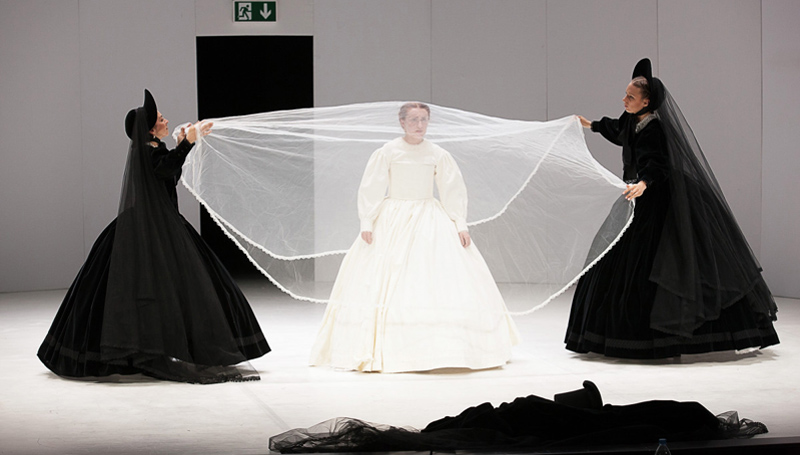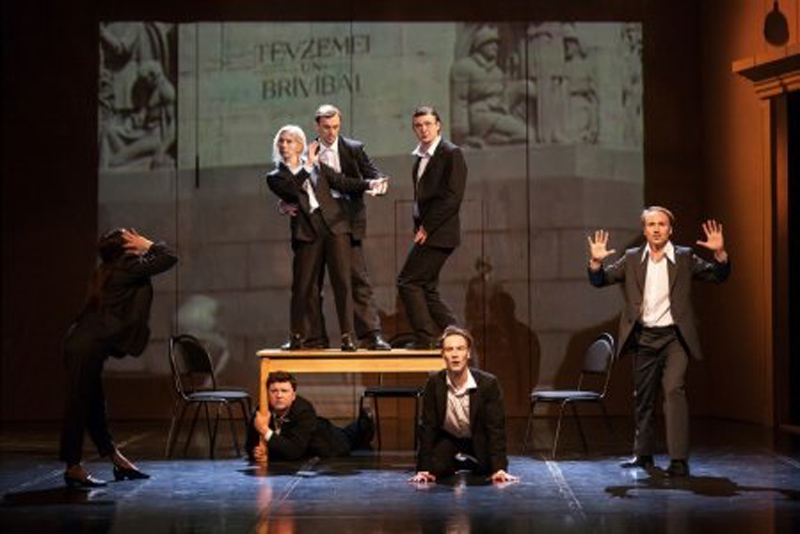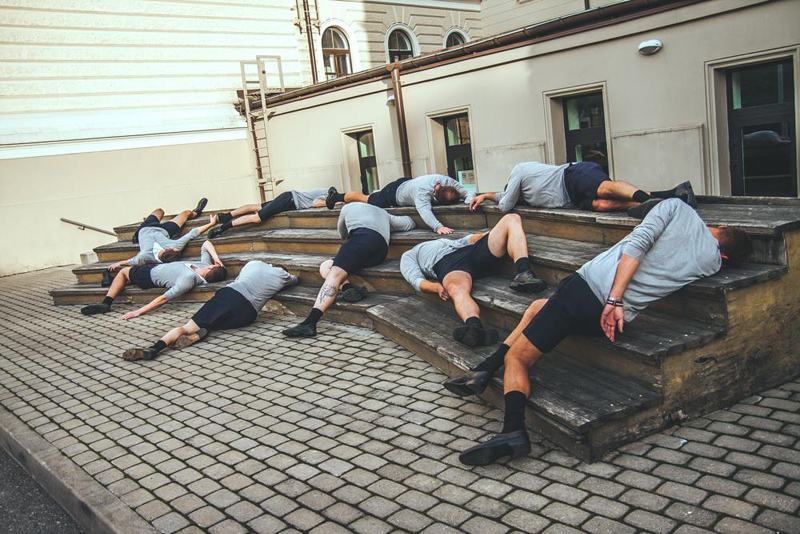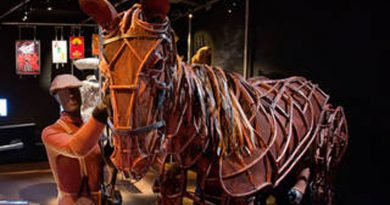Riga Russian Theatre
One might think that intercultural fusions in the Baltic state of Latvia are spurred by the country’s relatively recent adhesion to the European Union (new member as of the first of May 2004), but according to Katherine Wood a newly accelerating cooperation between Russian residents and Latvian theatre practitioners appears to be driven by friendship and the sense of a shared community, not by political agendas.
The Riga Russian Theatre: A Report by Katherine Wood
The Mikhail Chekhov Riga Russian Theatre in Latvia has played many roles over its one hundred and thirty-five-year history. As the oldest Russian theatre outside Russia, it has served as a cultural hub for pre-Revolutionary expatriates and as a refuge for persecuted Soviet artists. Now it is a meeting point for Russian and Latvian culture. Although the theatre remains a showcase for the Russian theatrical tradition in Latvia, it is also becoming a prominent example of Russo-Latvian integration. Over the past several seasons, an increase in collaborations with Latvian practitioners from theatres such as the New Riga Theatre and the Latvian National Theatre has brought different tastes and traditions together to form a new hybrid. In my opinion, one of the reasons this cultural hybridisation is so noteworthy is that it has occurred outside the arena of politics.
Latvia has been independent from Russia for over twenty-five years now, and yet the Russian Theatre has flourished in that time, with almost half the audience being native Latvians. This is not the result of the theatre becoming conciliatory to local actors — for many years, a large proportion. of the actors, as well as the managing director, have been Latvian nationals and have mixed Russian and Latvian heritage. lt is not a result of Russian condescension or of Latvia gaining confidence after joining the EU in May 2004. Nor should it be seen as a competition where Latvian performance art is gaining strength. Instead, it is the result of natural cultural understanding and artistic compatibility. While this kind of integration has been taking place on a demographic level for several generations, it is now becoming more prominent in art itself, manifesting itself in the Russian Theatre’s productions.
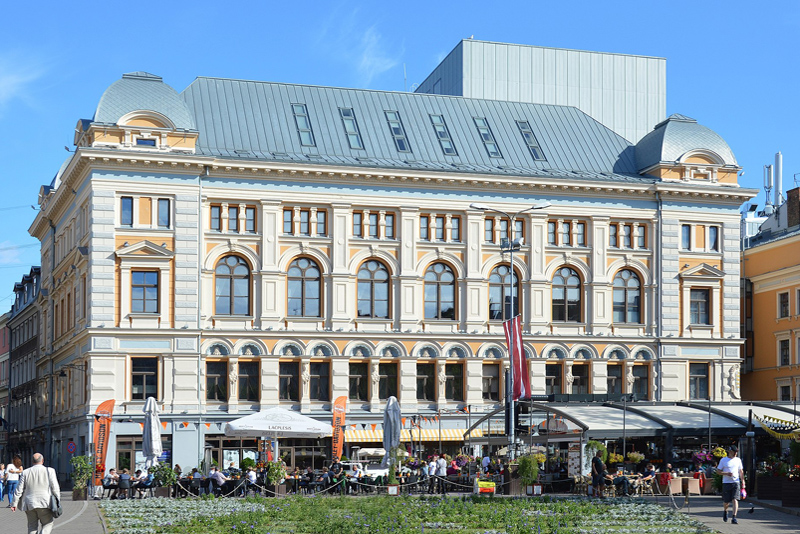
The Riga Russian Theatre has always concerned itself with making its productions accessible to both Russians and Latvians. However, the past two years have seen a noticeable increase in projects involving Latvian directors and actors from outside the Riga Russian Theatre. One such project is Medea, starring Guna Zarina. One of Latvia’s most celebrated actresses, Zarina is based at the New Riga Theatre, which was founded in 1992 and has since gained a reputation for modern and progressive productions. Medea was a sell-out since its premiere in October 2016. Lina Ovchinnikova, the Riga Russian Theatre’s head of public relations, explains that “one attractive aspect of this production is the opportunity to see Guna Zarina in a different company – in a different theatre, with different actors and partners.” Her energy and onstage charisma are huge, and people come to see the production a second or third time. Two other productions were staged by Latvian directors in the 2016-17 season: Elmars Senkovs’s production of Bertolt Brecht’s The Good Person of Szechwan and Viestur Kiriesh’s production of Shakespeare’s King Lear.
Elmars Senkovs is an established director at the Latvian National Theatre in Riga, and for him staging his production at the Riga Russian Theatre was an explicit attempt to immerse himself culturally. “l thought this would be a good method of integration. A teacher of mine told me that every [ethnic] Latvian should make friends with an [ethnic] Russian, because that’s the best means by which a society achieves integration. The friend learns about Latvian society, you learn about Russian society, and you begin to understand that we’re all Latvians [by homeland] regardless of the language we speak. You live in an independent country, and in order to be stronger you need to be together, not separated. politics, of course, disrupts this friendship, which is unpleasant. As soon as there are political problems, conflicts arise, opinions diverge. But when you work in the theatre, it doesn’t affect you?
Photo credit: Didzis Grodzs.
Jana Lisova, one of the Riga Russian Theatre’s actors, feels that these collaborations are taking the theatre’s repertoire into a new phase of its development: “Over the past year we’ve invited a lot of Latvian directors to work here. They are the country’s leading directors at the moment, and they’re bringing new forms into the theatre. The theatre is trying to stay up-to-date; it’s offering to introduce people to a varied repertoire, a variety of productions, because up to now our audience had become used to seeing productions in a certain style? The fresh perspective of Latvian directors has introduced minimalism and experimentation into the Riga Russian Theatre.
While this break with convention has caused controversy with some theatregoers, Senkovs feels that it is a risk worth taking: “The audience isn’t stupid; they also feel like seeing something different … An unusual production comes along and it’s interesting. One person might not understand it, but for others it’s interesting.” Maksim Busel, who has been an actor at the Russian Theatre since 2014, is a strong believer in the new trend: “Our repertoire is much less one-sided. Before, it really was for a Russian public: Russian classics, staged in the Russian style – bright and colourful — not how Latvians like it. But from this year Latvians also come to watch and they like what they see? The Russian Theatre company’s increasing collaboration with Latvian theatre professionals is creating a change not only for the audience but also for the actors and directors themselves. Many of the theatre’s company feel that they benefit from a variety of directorial approaches.

Jakov Rafalson as King Lear.
Photo credit: Didzis Grodzs.
Dana Bjork, who is now preparing to take on the role of managing director at the theatre, has been acting with the Russian Theatre for eight years and enjoys working in a Russian environment because of its “honest approach to everything, its openness? Despite this, she has found that Latvian directors often give her more freedom on the stage: “Most of the Latvian directors I’ve worked with gave me, as an actor, the chance to be creative on the stage— to think of ideas, to make suggestions, even to develop storylines? On the other hand, many of the actors value Russian directors for their straightforward approach and their readiness to express their feelings. For Ivan Klochko, one of the younger generation of actors, “It’s better when a person says it as it is … With a Russian, there will be thunderbolts and the walls will shake, but that’s just how they are. Deep down, it’s how they express their love?
For Latvian directors, too, working with Russian actors is an opportunity to produce work which wouldn’t be possible elsewhere. Although many Latvian actors are taught according to the Russian school of psychological realism, they have a distinct acting style; Elmars Senkovs explains that “Russian actors want to play everything bigger, more actively. It’s a good quality, because you can’t achieve this with Latvian actors. Russian actors always want to add more? Use of this Russian school of acting is one of the main principles underlying the Russian Theatre, along with the use of the Russian language, of course. Ovchinnikova breaks the theatre’s philosophy down into stages: “ln our approach, there are three levels. At the base there’s the Russian dramatic school and the Russian language; the second level is the (Russian) works; and the third is the directors and artists we invite from Russia to work here. However, working with Latvian directors more frequently could be bringing about a change: “When Latvian directors work with us, something new comes into the tradition. Then, it’s the actors themselves who remain the carriers of the Russian tradition, and a kind of synthesis is formed?
Photo credit: Didzis Grodzs.
So, can the Russian Theatre retain its Russian identity in the face of this new drive towards integration? For many of the actors here, the theatre’s identity is not simply ‘Russian’ but ‘Russian in Latvian. They believe that some form of integration is essential for a theatre which finds itself in a multi-cultural country. Jana Lisova shares this view: “Every theatre should express the realities of its country. In this country, uniting cultures is a relevant issue?
This is not only applicable to the theatres repertoire but can also be said of the company itself. Many of the actors, especially the younger generation including Jana, Dana, and Ivan, are from Russo-Latvian families and see themselves as neither fully Russian nor fully Latvian. Even those who are ethnically Russian but grew up in Latvia have difficulty identifying themselves. Maksim Busel, for example, describes himself as “a Russian-speaking European?
Undoubtedly, Russo-Latvian integration has been happening in Riga on a civilian level for centuries, and perhaps the theatre’s changes in the Riga Russian Theatre over the past few years should simply be seen as the most recent manifestation of this. Jakov Rafalson, one of the Riga Russian Theatre’s most beloved actors and the recipient of Latvia’s highest honour, the Order of the Three Stars, sees it this way. For him, the theatre channels culture, and its choices are a reflection of a wider multi-cultural trend which should be embraced: “Integration is always taking place, always. It can’t be any other way. As soon as a nation only takes from within itself, it degenerates. . All I hope for is mutual understanding and kindness; with this, our trend towards integration will yield completely amazing results?

